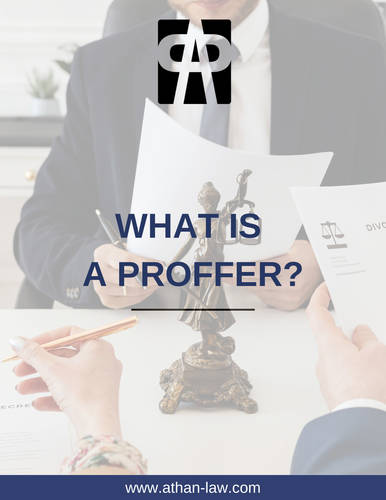
In a criminal investigation, a proffer is an opportunity for an individual to share information with law enforcement and/or the prosecutor. Although participating in a proffer can be helpful when seeking a resolution in white-collar cases, it requires careful consideration and guidance from an experienced attorney.
A proffer session allows individuals under investigation, often in white-collar crime cases, to share information that might be useful to the government’s case. In return, these individuals may receive a chance at a more favorable deal or reduced charges. However, it is important to understand that participating in a proffer session does not guarantee a better outcome.
These sessions generally take place in a U.S. Attorney’s Office or a similar setting. The target of the government’s investigation, accompanied by their attorney, meets with the prosecutor and investigating agents. The session typically begins with the defense attorney giving an outline of the information the individual will provide, followed by questions from the prosecutor or agents.
Participation in a proffer session often includes certain protections for the individual sharing information. These protections are outlined in the proffer agreement, which is a formal contract between the individual and the prosecuting authorities. Typically, these protections include:
Failure to meet the proffer agreement or providing conflicting information could allow prosecutors to use these statements during sentencing. Additionally, making false statements to federal agents may lead to prosecution.2
These safeguards offered in a proffer session may vary depending on the jurisdiction and the terms agreed upon by the involved parties. For this reason, anyone considering a proffer session should thoroughly review the proffer agreement with their legal counsel to understand their rights and the protections available.
As you navigate the complexities of legal proceedings, The Law Offices of Athan P. Papailiou is committed to supporting you every step of the way. Whether facing legal challenges or addressing other legal matters, our dedicated team is prepared to offer personalized guidance and representation tailored to meet your needs. Reach out to us at (509) 215-4679 or contact@athan-law.com to schedule a consultation.
1See Fed. R. Evid. 410(b) (permitting admission of a statement “in any proceeding in which another statement made…if in fairness the statements ought to be considered together; or in a criminal proceeding for perjury or false statement, if the defendant made the statement under oath, on the record, and with counsel present”).
2See 18 U.S. Code § 1001(a)(2) (stating that making any materially false, fictitious, or fraudulent statement or representation “in any matter within the jurisdiction of the executive… branch of the Government of the United States” shall be punishable by not more than 5 years of imprisonment).
Disclaimer: The information provided on this article is for educational purposes only and is not intended as legal advice. Every case or situation is unique, and you should consult with a licensed attorney before taking any action. No attorney-client relationship is formed by downloading or reading this article.
Posted June 20, 2025
